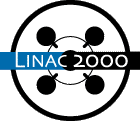
Sung-il Kwon, A. H. Regan, Y. Wang, T. S. Rohlev (LANL), M. Prokop, D. Thomson (Honeywell)
Learning control is an iterative approach to the problem of improving transient behavior for processes that are repetitive in nature and operate over a fixed time interval[1]. In this paper, we propose a PID type iterative learning controller which suppresses the repetitive beam loading effect and the RF on-off transient in the cavity field of a pulsed linac. The complete controller for the cavity field control consists of the feedback PI controller and the PID type iterative learning controller. The fixed gain feedback PI controller guarantees the stability of the closed loop system and keeps its tracking errors within uniform bounds. The PID type iterative learning controller is in the feedforward path and generates the next input, given current tracking error and current input so that the performance error will be reduced on the next iteration. Due to its nature, the iterative learning controller may reduce influence of repetitive disturbances, repetitive uncertainties such as Lorentz force detuning in superconducting cavity as iteration increases. Also, the convergence of the proposed controller is investigated based on the Lyapunov stability theory[2].
[1] K. L. Moore, M. Dahleh, and S. P. Bhattacharyya, 'Iterative Learning Control: A Survey and New Results,' Journal of Robotic Systems, Vol. 9, No. 5, pp. 563-594, 1992.
[2] H. K. Khalil, Nonlinear Systems. Upper Saddle River, NJ: Prentice Hall, 1996.
Comments or Questions to
linac2000@slac.stanford.edu